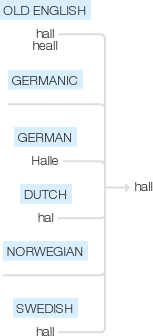Hall
Old English hall, heall (originally denoting a roofed space, located centrally, for the communal use of a tribal chief and his people); of Germanic origin and related to German Halle, Dutch hal, also to Norwegian and Swedish hall .
wiktionary
From Middle English halle, from Old English heall(“hall, dwelling, house; palace, temple; law-court”), from Proto-Germanic *hallō(“hall”), from Proto-Indo-European *ḱel-(“to hide, conceal”). Cognate with Scots hall, haw(“hall”), Dutch hal(“hall”), German Halle(“hall”), Norwegian hall(“hall”), Swedish hall(“hall”), Icelandic höll(“palace”), Latin cella(“room, cell”), Sanskrit शाला(śā́lā, “house, mansion, hall”).
etymonline
hall (n.)
Old English heall "spacious roofed residence, house; temple; law-court," any large place covered by a roof, from Proto-Germanic *hallo "covered place, hall" (source also of Old Saxon, Old High German halla, German halle, Dutch hal, Old Norse höll "hall;" Old English hell, Gothic halja "hell"), from PIE root *kel- (1) "to cover, conceal, save."
Sense of "passageway in a building" evolved 17c., from the time when the doors to private rooms opened onto the large public room of the house. Older sense preserved in town hall, music hall, etc., in use of the word in Britain and Southern U.S. for "manor house," also "main building of a college" (late 14c.). French halle, Italian alla are from Middle High German. Hall of fame attested by 1786 as an abstract concept; in sporting sense first attested 1901, in reference to Columbia College; the Baseball Hall of Fame opened in 1939. Related: Hall-of-famer.
